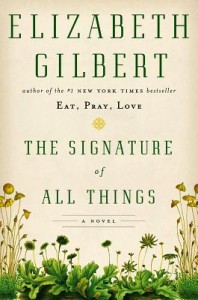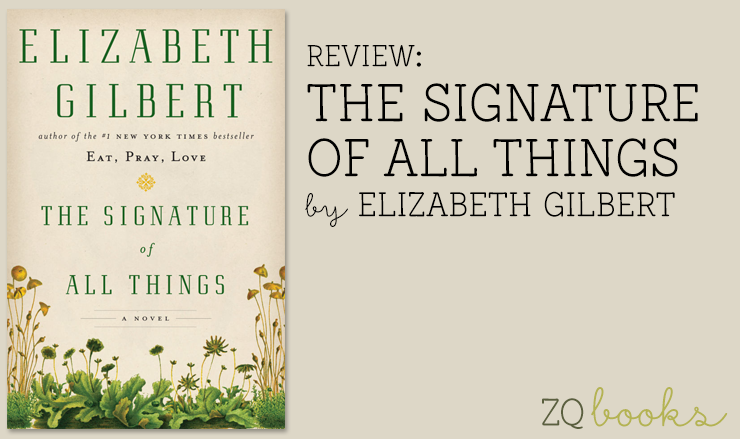A historical, fictional saga of epic proportions, THE SIGNATURE OF ALL THINGS will fascinate those who have an interest in botanical or scientific exploration, featuring an imperfect heroine who discovers her life’s passion.

Category: Historical Fiction
Publisher: Viking Adult
Release Date: October 1, 2013
ISBN: 978-0670024858
Rated 5 + Recommended Read
Available in Print and eBook
This novel is an impressive creation, filled with adventure across the globe as we follow several characters in their travels for botanical research. Alma and her father are the main characters throughout the book but there are many significant secondary characters who add interest, drama, humor and sadness, including real historical figures you’ll recognize.
In 1770, Henry Whittaker is ambitious and has no respect for his father who is honest, yet poor. Ashamed of his father’s lack of ambition, Henry makes his own way by stealing. With his father working at Kew gardens for Sir Joseph Banks, a rare plant hoarder in Henry’s estimation, he feels obliged to share with those whom Banks refuses. So, Henry works with his father during the day, then steals and propagates plants at night to export to numerous clients. Unbeknownst to Henry, his father discovers and reports his crimes to Banks, hoping to preserve his family’s integrity. Banks confronts Henry and is completely enamored by his bold unrepentant nature, laughing (as did I) at Henry’s audacity, which works in his favor. He decides to use Henry’s “talents” by sending him off to sea with Captain Cook as an assistant to another botanist, essentially becoming Banks’ informant. Henry’s nickname for himself made me laugh because it describes him perfectly as a thorn of power in everyone’s side. He eventually seeks a wife like he does everything else and marries Beatrix, an intelligent Dutch woman anxious to get away from her family.
Henry Whittaker becomes the richest man in Philadelphia, with Beatrix at his side, by the time Alma is born in 1800. We really can’t truly understand Alma until we understand her father, who is instrumental in much of Alma’s life. Alma isn’t pretty but her mind is exceptional, just like her mother’s. Beatrix teaches Alma several languages at a very young age, just as she was taught by her family. Both her parents believe in pushing Alma intellectually, encouraging her to use her mind to debate with their guests at dinner. Avoiding children because she prefers adult conversation, Alma never really learns how to socialize other than with her peers. She spends her childhood exploring their estate, eventually focusing on botany like her father.
When Alma’s parents decide to adopt Prudence, Alma is well acclimated to being the center of attention. Accepting a sister, especially one who isn’t as well educated as herself, isn’t easy, but they learn to tolerate one another. What will become of these two women in an age when being an intelligent woman may not equal a happy life? Will their wealth be a hindrance or the common ground that binds them?
Alma is far from a perfect heroine. Some of her faults take her a lifetime to recognize. Above everything, Alma is a thinker and it is her self-evaluation throughout the novel that gives balance to her life. But will she be able to forgive herself for her worst moments?
Moss in KY Cumberland Falls State Park, Photo by Dorine (C) 2013
Having a horticulture background, botany was the reason I chose this book for review. I thoroughly enjoyed how the story unfolded and couldn’t read fast enough. Normally when I read a book this intricate with a high page count, I need to take breaks in-between and read other books. Not with this one. It held my attention and called me back to it when I was away. I can’t tell you if it is all historically accurate or not, but it sure is believable in the way it is presented. The botanical descriptions are absorbing and the fact that the majority of the book is about a female botanist added to the intrigue. There were a few paragraphs where my eyes glazed over from the elaborate detail describing the variances of moss, but for the most part, I thoroughly enjoyed every word. Having been enamored by moss enough myself over the years, enough to obsessively photograph it, I feel as if my inner geek has been vindicated.
But it is not all about botany as it’s also about art, science, philosophy and religion. It’s about assimilating research and proving theories while debating the entire process with colleagues. It’s about human emotion and how singular devotion to the study of science can isolate any man or woman. I think anyone who loves research and knowledge will appreciate the volume included in this novel, as well as how it was organized to be such a beautiful, cohesive story. It might be overwhelming to someone who isn’t interested in the thinkers of this era, but I think everyone should try it as it encompasses such a wide variety of historical topics.
This fascinating historical novel can be considered romantic, in part, as well as sensually explicit, but it won’t meet your expectations if you’re expecting a traditional romance. It’s a fictional novel containing life’s surprises, focusing on the life and survival of an intelligent, well-educated woman in a man’s world. I did have moments where I wondered why some of Alma’s personal habits were focused on, but by the end of the book it all became clear. Alma is a complicated character and by following her life, you also follow history in the making.
A rare historical exploration into the science of plants, filled with interesting characters and theories, THE SIGNATURE OF ALL THINGS is brilliantly rendered. Historical enthusiasts will find Alma’s story riveting as a woman before her time. Author Elizabeth Gilbert’s talent is recognized in the enormity of the research involved to create a novel with such historical ambiance, but it was her deft hand at characterization that made me sob when all hope seems lost, then sigh with contentment when all is as it should be. An extraordinary historical journey, THE SIGNATURE OF ALL THINGS is riveting from beginning to end. Highly recommended!
Review by Dorine, Courtesy of Romance Junkies.
Support this site by following the above links, buying books by clicking on the graphics, or commenting below…
What’s on your TBR Mountain Range? Do you read historical fiction? What’s your favorite time period in history to read about?
